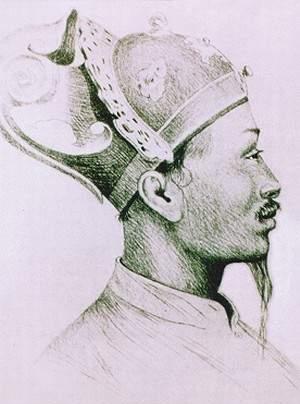<Back to Index>
- Chemist and Physicist Michael Faraday, 1791
- Architect Erik Gunnar Asplund, 1885
- Emperor of Vietnam Tự Đức, 317


Emperor Tự Đức (22 September 1829 – 17 July 1883) (full name: Nguyễn Phúc Hồng Nhậm, also Nguyen Phuc Thi) was the fourth emperor of the Nguyễn Dynasty of Vietnam and reigned from 1847–1883.
The son of Emperor Thiệu Trị, Prince Nguyen Phuc Hong Nham was born on 22 September 1829, and succeeded his father on the throne, with the reigning title of "Tự Đức", but family troubles caused his era to have a violent start. Thiệu Trị had passed over his more moderate eldest son, Hồng Bảo, to give the throne to Tự Đức, known for his staunch Confucianism and opposition to foreigners and innovation. As a result, and due to the repressive policies of the previous Nguyễn Dynasty emperors, there was now a great deal of dissatisfaction with Nguyễn rule and a legitimate royal figure to rally this opposition.
Crown
Prince Hồng Bảo became the leader of a rebellion against Tự Đức,
consisting of Confucian scholars who were angered that the family
hierarchy had been dishonored (by passing over the eldest son) some
remaining supporters of the Lê Dynasty (who
many still considered the legitimate dynasty of Vietnam) as well as the
usual peasants angry over Nguyễn taxation and the usual corrupt mandarins as well as the Roman Catholic missionaries and Christian converts who had been so persecuted by Minh Mạng and
Thiệu Trị. With swift military force, Tự Đức suppressed the rebellion
and was set to execute his brother, but was dissuaded by his mother, Dowager Empress Từ Dũ, and Hồng Bảo killed himself in prison. Emperor
Tự Đức continued the policies of his predecessors, shutting Vietnam off
from the outside world and refusing all efforts to modernize the
country. Accounts of his personal life show a gentle and educated man,
but his policies brought on conflict with Europe that
Vietnam could not win. He oppressed all foreigners in Vietnam,
especially the Christian community, calling their religion a "perverse
doctrine". The Christian mandarin Nguyễn Truong To, tried to convince
Tự Đức that this was a suicidal policy, but he did not listen,
confident that France was too involved with the chaos in Europe in 1848 to respond, but he was mistaken. France
responded with a large military expeditionary force and attacked up
from southern Vietnam. The Nguyễn army fought bravely for some time,
but their antiquated weapons and tactics were no match for the French,
who suffered more from the climate and disease than from enemy
resistance. With French forces moving closer against him, Tự Đức called
upon his Chinese over-lord, the Qing Emperor, for help and so ensued the Sino-French War. The fighting around Hanoi against China and the Black Flag pirates
ended with France victorious and China gave up their position as feudal
master of Vietnam and recognized France as the ruling power over the
region. To
make matters worse, Emperor Tự Đức had to deal with renewed internal
rebellions which had become commonplace for the Nguyễn Dynasty. There
were literally hundreds of small rebellions and uprisings against
Nguyễn rule. Oppression of the Christian missionaries was also the
biggest source of trouble, including the execution of a Spanish bishop
which led to the fall of Saigon to
the French. By an order of 1848 Tự Đức commanded all Vietnamese
Catholic converts to renounce their religion, otherwise they would be
branded on the face with the mark of a heretic and surrender all of
their rights and privileges. This oppression rallied most of the
European powers against Vietnam, and Tự Đức by doing this had given up
any hope of Vietnam gaining help as a victim from the outside world. When
further rebellions broke out as the French were advancing on the
capital, Tự Đức feared that his authority was crumbling. He preferred
to make a deal with the French so that he could crush the rebellion
since while France may demand humiliating concessions, the rebels would
most likely depose and/or kill him. He signed away the southern most of
Vietnam, Cochinchina,
to be a French colony and accepted the status of a French protectorate
for his country. This caused a huge uproar, and many, such as the
famous mandarin Truong Dinh,
refused to recognize the treaty and fought on in defense of their
country, denouncing Tự Đức for surrendering any part of their homeland. Emperor
Tự Đức did not live to see the worst effects of colonialism on his
country, but he is often regarded as the last Emperor of Vietnam, since
he was the last to rule independently. A case of smallpox left him impotent so he had no children despite a huge harem of wives he kept in his palace. According to legend, he died in 1883 cursing the French with his dying breath.